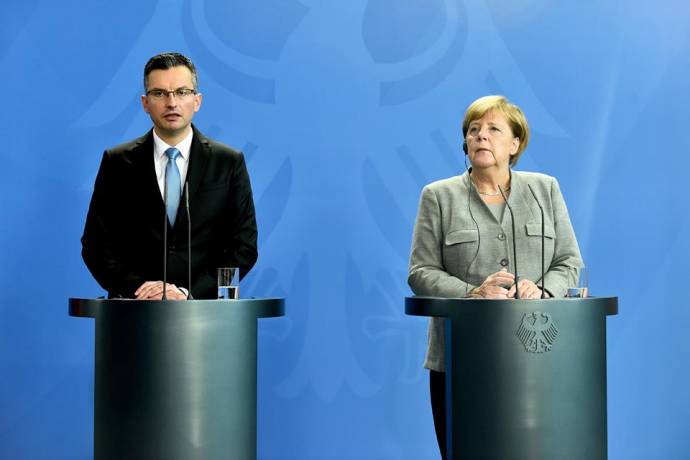"Germany will support all efforts to resolve the border dispute," she said at a joint press conference with Šarec. Resolving the dispute is primarily the task of both countries but given other problems the EU faces, "it would be desirable if this problem was resolved," she added after she received Šarec with military honours.
Merkel also indicated she was willing to get personally involved to "contribute to the dispute resolution if that is so desired," but stressed this would not be resolved in public.
Šarec noted that Slovenia was only willing to talk about how to implement the border arbitration tribunal's award and stressed that it was not a "one issue country," a reference to criticism that Slovenia's foreign policy has been consumed by the border dispute with Croatia.
He said Slovenia was ready to constructively take part in the resolution of all pressing issues in the EU.
Speaking to Slovenian reporters after the press conference, Šarec clarified that Merkel was offering help regarding implementation.
"The chancellor cannot act as mediator, the court already did that. But she can help by saying that the ruling needs to be respected and implemented, which is our job. That's how I understood this."
The pair discussed a wide range of issues, including preparations for next week's EU summit, Brexit, and migrations, in particular the protection of the EU's external borders.
Both officials said the two countries shared similar views on these issues.
"We wish to say that we are close on many issues. We both think Europe needs to be built on the basis of cooperation," Šarec said.
He described Slovenia as a country that "does not wish to just seek benefits, we also want to give something to the EU."
This is also why it is "defending Schengen." "We will continue to perform our duty. Internal security is of utmost importance, including for the economy," he said.
Merkel said that Slovenia was doing "everything to protect the external Schengen border" and would get support if it needs it, mentioning the EU's border protection agency Frontex.
Šarec said Frontex could be used in protecting the EU's external borders, for example Croatia's border with Bosnia and Serbia.
Merkel described the talks with Šarec as well as bilateral cooperation and trade as very good, while also noting that Slovenia was a "reliable destination for German investors."
Šarec likewise highlighted trade, noting that the annual trading volume of EUR 12bn was impressive for a country of Slovenia's size.
The prime minister said after the press conference that the visit had been a success. "Some say we're excessively pro-American. I don't think we are. I think I have sent out a signal with this visit that we remain pro-European," he said.







